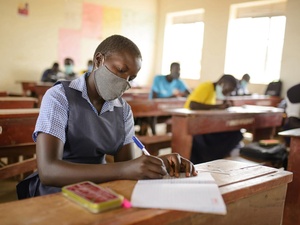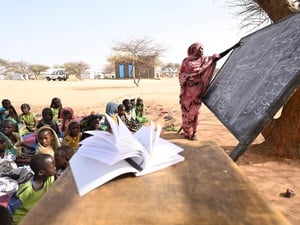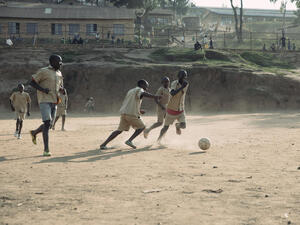Solutions found for East Timor's separated children
Solutions found for East Timor's separated children

Ursula fled with her uncle to Atambua, West Timor, in 1999. She returned to Dili in 2001 and now 17, is attending junior high school in the East Timorese capital.
BALI, Indonesia, Dec 14 (UNHCR) - Strong emotions swirl around the issue of children who become separated from their families during times of conflict. Tracing their parents and finding loving carers while searching for a long term solution is a difficult task.
The upheaval as East Timor separated from Indonesia in 1999 left several thousand children separated from their families - often across an international border - after a large and brutal population displacement. Protecting some 4,000 highly vulnerable children from neglect and abuse while trying to find solutions was a major challenge for UNHCR.
But after five years of tireless effort, UNHCR, working with authorities from Indonesia's Department of Social Affairs and Timor-Leste's State Secretariat for Labour and Solidarity, has found suitable solutions for all but 107 cases.
"While the reunification of the children with their families is a desirable solution, it is by no means the only solution that's been pursued," UNHCR's Regional Representative based in Jakarta, Robert Ashe, told a meeting of government officials in Bali on child protection on December 11.
"Taking into account the cultural traditions in Indonesia and Timor-Leste, we have pursued solutions in the best interests of the child, including the child staying with the caretaker, with the agreement of the parents, for purposes of completing their education," Ashe added.
At the end of November 2004, out of a total of 4,534 registered cases of separated children, 2,365 children had been reunited with their families, and it has been agreed that 1,156 will continue to stay with their caregivers in Timor-Leste and Indonesia.
"Much of this work has been difficult as it often arouses intense emotions. However, I would like to pay tribute to the many caretakers of these children, both in Indonesia and Timor-Leste who, over the years, have invested their time, energy, money and in many cases, considerable love, in taking care of the children and looking after their welfare," Ashe said.
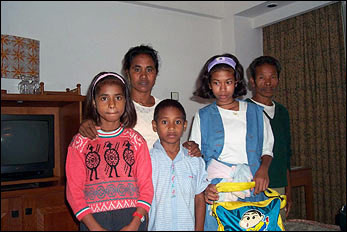
Gilberto (centre) and Illidia (left) with their mother after reunification in West Timor in 2001.
The UNHCR Regional Representative told officials that many caregivers, after giving years of care, had taken tough decisions and agreed to the reunification of the children with their parents.
"It's an indication that they have the best interests of the child at heart. Similarly, those parents who have agreed to let the child remain with the caretaker to complete their education and to give them a better start in life is a tribute to the love that parents have for their child," Ashe added.
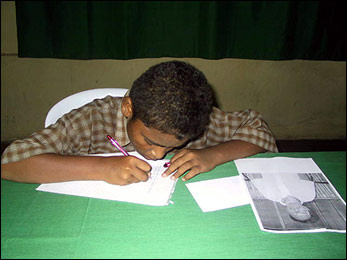
Simplicio, one of UNHCR's pending cases in Atambua, with a photo of his father as he writes to his family in East Timor.
While working to satisfactorily resolve the cases of the separated children, UNHCR has held three workshops to create a pool of Indonesian and Timor-Leste government focal points trained to deal with separated children and aware of how to apply the principles of international and national law.
In a crucial step to ensuring the protection of separated children in both countries, a Memorandum of Understanding between Indonesia and Timor-Leste was signed at the Bali meeting over the weekend. It sets out how cases of the remaining 107 children will be managed, monitoring arrangements for the children who have been allowed to stay with their caregivers, and how in the future new cases of separated children will be managed.
"Your commendable efforts to find solutions for these children, which have been expressed in many tangible ways, are proof of your commitment to your children, who will be the future of both your countries," Ashe told Indonesia and Timor-Leste government officials at the Bali meeting.



